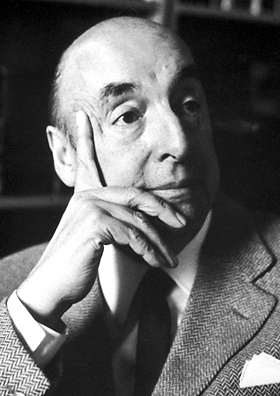
On this date in 1971, world-famous Chilean poet Pablo Neruda(penname of Neftalí Ricardo Reyes Basoalto) won the Nobel Prize for Literature”for a poetry that with the action of an elemental force brings alive a continent’s destiny and dreams.”
Neruda (1904-1973) was born in the Chilean town of Parral. He spent his childhood and youth in Temuco, where he knew the poet Gabriela Mistral, head of the girls’ secondary school, who took a liking to him. He started publishing at the age of thirteen. In 1920, he beganwriting under the name of Pablo Neruda, which he adopted in memory of the Czech poet Jan Neruda (1834-1891). His first published book was Crepusculario (At Twilight, 1923), followed the next year by Veinte poemas de amor y una canción desesperada(Twenty Poems of Love and a Desperate Song), one of his best-known and most translated works.
Between 1927 and 1935, the government put him in charge of a number of honorary consulships, which took him to Burma, Sri Lanka, Java, Singapore, Buenos Aires, Barcelona, and Madrid. His poetic production during that difficult period included, among other works, the collection of surrealistic poems Residencia en la tierra (Residence on Earth, 1933), which marked his literary breakthrough.
The Spanish Civil War and the murder of Federico García Lorca, whom Neruda knew, affected him strongly and made him join the Republican movement, first in Spain, and later in France, where he started working on his collection of poems España en el corazón (Spain in Our Hearts, 1937). This volume had a great impact by virtue of its being printed at the front during the Civil War. The same year he returned to Chile, to which he had been recalled. His poetry during the following period showed an orientation toward political and social matters.
In 1939, Neruda was appointed consul for Spanish emigration, residing in Paris, and, shortly afterwards, consul general in Mexico, where he rewrote his Canto general de Chile, transforming it into an epic poem about the whole South American continent, its nature, its people and its historical destiny. This work, entitled Canto general, was published in Mexico in 1950, and also underground in Chile. It consists of approximately 250 poems brought together into fifteen literary cycles and constitutes the central part of Neruda’s production. Shortly after its publication, Canto general was translated into some ten languages.
Returning to Chile, in 1945 Neruda was elected senator of the Republic, also joining the Communist Party. Due to his protests against President González Videla’s repressive policy against striking miners in 1947, he had to live underground for two years until he managed to leave in 1949. After living in different European countries he returned home in 1952.
Neruda’s 1952 stay in a villa on the island of Capri was fictionalized in Antonio Skármeta’s 1985 novel Ardiente paciencia (Ardent Patience, later known as El cartero de Neruda, or Neruda’s Postman), which inspired the popular 1994 film Il Postino (The Postman) and an opera by Daniel Catán which starred Plácido Domingo as Neruda.
In the 1950s he published Las uvas y el viento (Grapes and the Wind, 1954), regarded as a diary of exile. In Odas elementales (Elemental Odes, 1954- 1959) the subjects of his poems – things, events and relations – are duly presented in alphabetic form.
Neruda’s extensive production has been gathered into numerous volumes of collected works.Saluting the anti-fascist victory at Stalingrad he wrote “Canto a Stalingrado” and “Nuevo canto de amor a Stalingrado“) and later poetry honoring his political heroes. Aside from the Nobel, he also received the International Peace Prize in 1950, the Lenin Peace Prize and the Stalin Peace Prize in 1953.
Neruda died of cancer only days following the coup that overthrew his compañero, socialist President Salvador Allende of Chile, although the circumstances of his death have been debated.
They Receive Instructions Against Chile
But we have to see behind all these, there is something
behind the traitors and the gnawing rats,
an empire which sets the table,
and serves up the nourishment and the bullets.
They want to repeat their great success in Greece.
Greek playboys at the banquet, and bullets
for the people in the mountains: we’ll have to destroy the flight
of the new Victory of Samothrace, we’ll have to hang,
kill, lose men, sink the murderous knife
held to us from New York, we’ll have to use fire
to break the spirit of the man who was emerging
in all countries as if born
from the earth that had been splashed with blood.
We have to arm Chiang and the vicious Videla,
give them money for prisons, wings
so they can bomb their own populations, give them
a hand-out, a few dollars, and they do the rest,
they lie, bribe, dance on the dead bodies
and their first ladies wear the most expensive minks.
The suffering of the people does not matter: copper
executives need this sacrifice: facts are facts:
the generals retire from the army and serve
as vice-presidents of the Chuquicamata Copper Firm,
and in the nitrate works the “Chilean” general
decides with his trailing sword how much the natives
may mention when they apply for a raise in wages.
In this way they decide from above, from the roll of dollars,
in this way the dwarf traitor receives his instructions,
and the generals act as the police force,
and the trunk of the tree of the country rots.
Adapted from Nobel Lectures, Literature 1968-1980, Editor-in-Charge Tore Frängsmyr, Editor Sture Allén, World Scientific Publishing Co., Singapore, 1993; biography.com; and Wikipedia. “They Receive Instructions Against Chile“ appears in “The Penguin Book of Socialist Verse,“ ed. Alan Bold, 1970.

MOST POPULAR TODAY

High Court essentially bans demonstrations, freedom of assembly in Deep South

Zionist organizations leading campaign to stop ceasefire resolutions in D.C. area

U.S. imperialism’s ‘ironclad’ support for Israel increases fascist danger at home

UN warns that Israel is still blocking humanitarian aid to Gaza







Comments